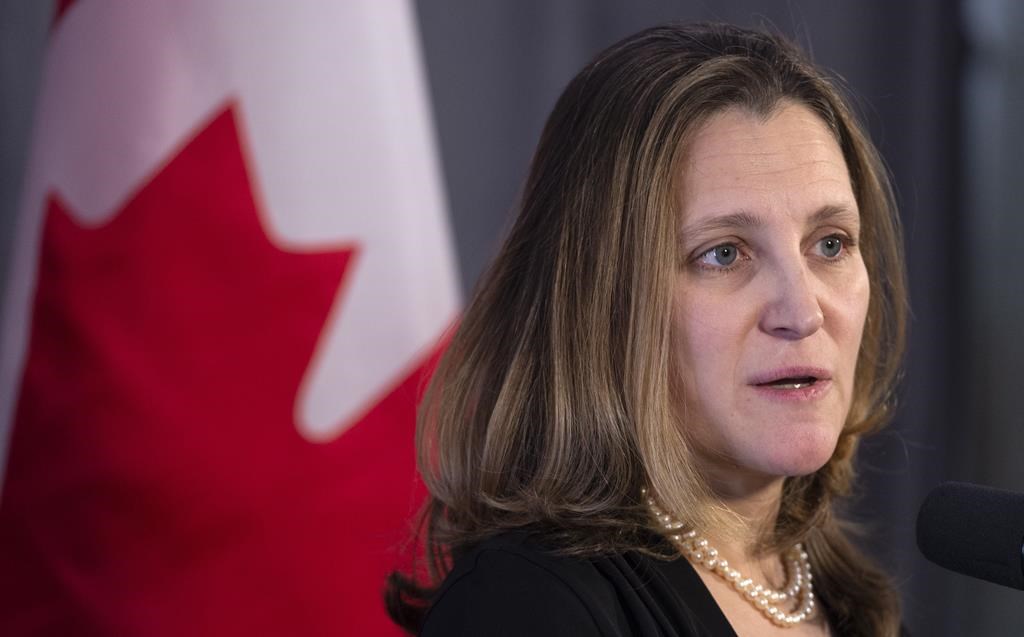Canada is supporting a genocide prosecution of the Myanmar government for systemic violence that forced more than 700,000 Rohingya Muslims to flee their country.

Gambia filed the genocide case Monday with the International Criminal Court in The Hague on behalf of the Organization of Islamic Co-operation, a group of 57 Muslim countries.
READ MORE: Myanmar troops’ sexual violence against Rohingya shows ‘genocidal intent’, UN report finds
Foreign Affairs Minister Chrystia Freeland said in a statement the move will advance accountability for the crime of genocide, which includes mass murder, systemic discrimination, hate speech and sexual and gender-based violence.
The Canadian government will look for ways to support Gambia’s legal efforts, she added. To that end, she said the government will enlist the help of former Liberal interim leader and longtime politician Bob Rae, who also served as Canada’s special envoy to Myanmar.
“Canada welcomes the Gambia’s submission to the International Court of Justice of an application to institute proceedings against the Government of Myanmar for alleged violations of the Genocide Convention. This move will help advance accountability for the genocide, which includes acts of mass murder, systemic discrimination, hate speech and sexual and gender-based violence against the Rohingya,” Freeland said in a statement on Monday.
“Canada will work with other like-minded countries to end impunity for those accused of committing the gravest crimes under international law … Ensuring that the perpetrators of these atrocities are held to account is imperative to provide justice to the victims and survivors while building lasting peace and reconciliation in Myanmar.”

Rae, in his report on Myanmar released last year, urged Canada to play a leading role in any international prosecution of the perpetrators of violence in the South Asian country.
Rae also predicted legal challenges for the international community if it decided to pursue a prosecution against Myanmar’s leaders for crimes against humanity.

Get breaking National news
The main challenge would be to create a credible and independent tribunal that could hear the case, he said, noting that special tribunals were set up to prosecute war crimes in Cambodia, Rwanda and the former Yugoslavia.
READ MORE: The rise of extreme Buddhism
In September 2018, the House of Commons unanimously supported a motion that said the crimes against the Rohingya were a genocide. The motion also reiterated a call for the UN Security Council to refer Myanmar to the International Criminal Court.
The motion coincided with a United Nations fact-finding mission that reported the Myanmar military systematically killed thousands of Rohingya civilians, burned hundreds of their villages and engaged in ethnic cleansing and mass gang rape. It called for top generals to be investigated and prosecuted for genocide.
A statement on Monday from Human Rights Watch on behalf of 10 international non-governmental organizations said the move by Gambia represented “the first judicial scrutiny of Myanmar’s campaign of murder, rape, arson, and other atrocities against Rohingya Muslims.”
It noted that Canada, Bangladesh, Nigeria, Turkey, and France “have asserted that Myanmar committed genocide against the Rohingya.”
In October 2018, Canada also stripped Aung San Suu Kyi, Myanmar’s civilian leader, of her honorary Canadian citizenship for her complicity in the atrocities. She had been renowned for her decades as a leader peacefully opposing her country’s military rulers.
Myanmar’s military launched attacks against the Rohingya in August 2017.
Most fled to neighbouring Bangladesh and have created one of the world’s largest refugee camps.








Comments
Want to discuss? Please read our Commenting Policy first.